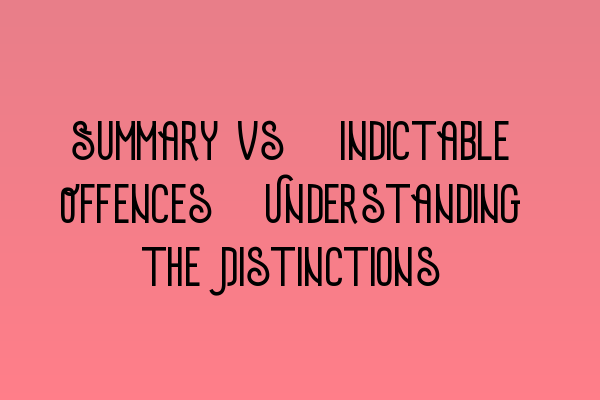Summary vs. Indictable Offences: Understanding the Distinctions
When it comes to criminal offences in the United Kingdom, they can be broadly classified into two categories: summary offences and indictable offences. Understanding the distinctions between the two is crucial for anyone navigating the legal system or studying criminal law. In this article, we will delve into the differences between summary and indictable offences, providing a comprehensive overview of each.
Summary Offences
Summary offences, also known as minor offences, are less serious crimes that are typically heard and decided by a magistrates’ court. These offences are usually punishable with a maximum prison sentence of six months and/or a fine.
Examples of summary offences include common assault, criminal damage, minor theft, public order offences, and some driving offences such as speeding or driving without insurance. However, it’s important to note that some offences can be either summary offences or indictable offences, depending on the circumstances and severity of the case.
Summary offences are generally considered less complex compared to indictable offences, and the procedures for handling them are relatively straightforward. Cases involving summary offences are typically resolved quickly, providing an efficient and cost-effective approach to justice.
Indictable Offences
Indictable offences, also known as serious offences, are more severe crimes that carry potentially higher penalties. These crimes are typically heard and decided by the Crown Court and can involve a jury trial.
Examples of indictable offences include murder, rape, robbery, serious drug offences, fraud, and other major crimes. These offences are typically punishable by longer prison sentences, often extending from a few years to life imprisonment.
Unlike summary offences, the procedures for dealing with indictable offences are more complex, involving various stages such as the preliminary hearing, pre-trial preparation, and the trial itself. The involvement of a jury in the decision-making process adds an additional layer of complexity to the proceedings.
It’s important to note that some indictable offences can be tried summarily in certain circumstances, allowing them to be heard and decided by a magistrates’ court. This usually occurs when the offence is of a less serious nature or when the defendant consents to a summary trial.
Conclusion
Understanding the differences between summary and indictable offences is crucial for individuals involved in criminal law, either as legal professionals or as individuals facing criminal charges. While summary offences are generally less serious and heard in magistrates’ courts, indictable offences carry higher penalties and are typically dealt with by the Crown Court. This understanding helps ensure that individuals are appropriately prepared and represented throughout the legal process.
